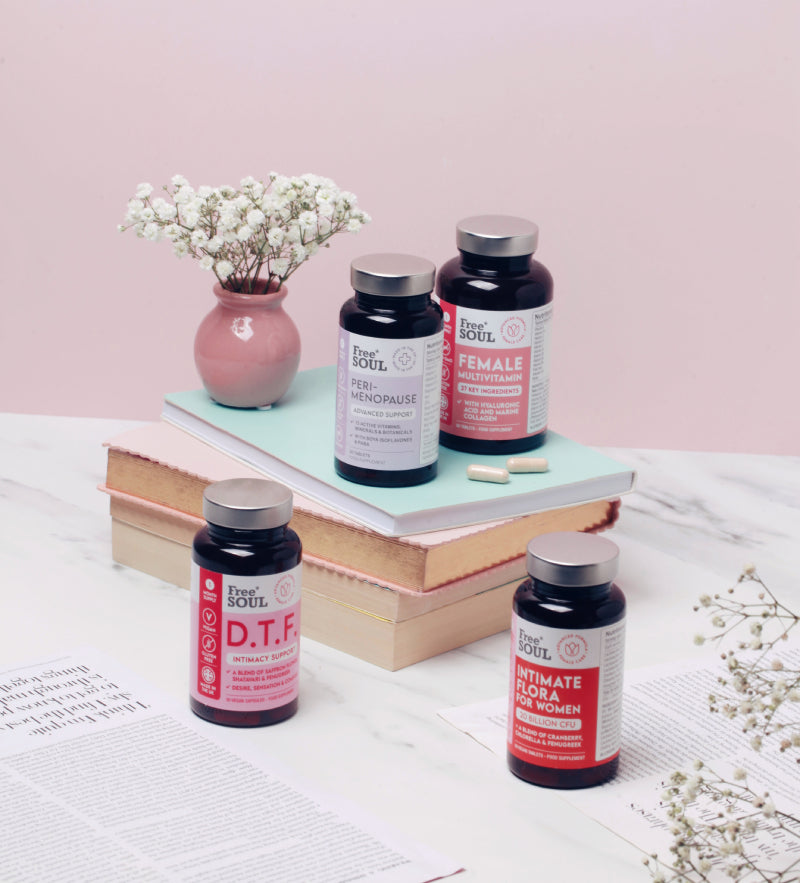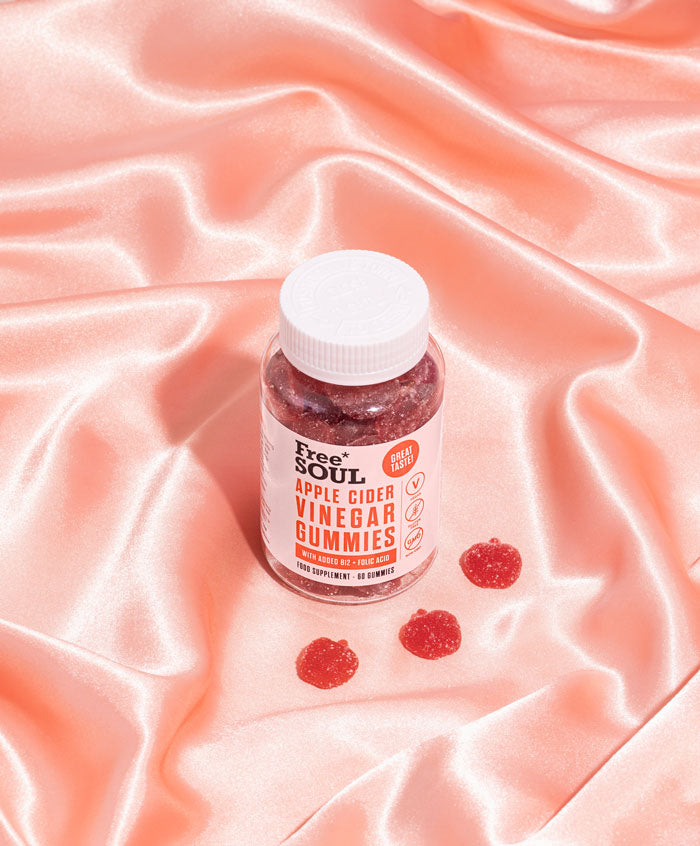What does creatine do for women? Benefits beyond the gym

When you think of Creatine, the first thing that comes to mind is probably lifting heavy weights at the gym – but what does Creatine do for women? For a start, it can help support mental clarity, hormone balance, and your overall well being, and those benefits are universal.
With a wave of Creatine content sweeping social media at the moment, it’s easy to get caught up in the hype (and confusion). We’re cutting through the noise to focus on the science-backed facts, especially for women, with Natalie Rouse, Registered Nutritionist and Head of Nutrition at Free Soul.
As she puts it, “Creatine isn’t just for performance. It’s a safe, well-researched supplement that can support women’s energy, strength, and cognitive function. Not just in the gym, but in everyday life”.
It’s not just about getting “gains”
There’s definitely been a “just for the gym bros” vibe around Creatine in the past, but that’s starting to change. Creatine supports strength, energy, recovery, and cognitive function. These are benefits that work for everyone, not just those who can bench press 200lbs.
You don’t have to be chasing muscle gains to take Creatine. Whether you’re pushing through a spin class or trying to make it to the end of a long day, Creatine gives your body and brain the backup to keep going – no matter how you move.
You may have heard some other myths floating around too, like the idea its effects are cancelled out by caffeine or that it dehydrates you – spoiler: it doesn’t. Check out our myth debunking blog for the full lowdown on Creatine misinformation.
But I heard creatine causes weight gain in women?
Fear not, Creatine won’t cause you to pack on the pounds. This misconception probably stems from its use in gaining muscle mass, but the truth is that pure Creatine contains zero calories.
Natalie explains, “Creatine draws water into your muscles, which may cause a slight temporary increase on the scales – but this is not fat gain, as Creatine contains no calories. It’s simply working as it should to hydrate your muscles on a cellular level”.
The science, simplified
Excuse us while we don our lab coats to explain exactly how Creatine works. It starts with ATP (adenosine triphosphate), a molecule that acts as the body’s primary energy carrier. You use ATP for quick, high intensity efforts, like sprinting, walking up a steep hill, or just powering through the end of a long day.
“Creatine is a high energy phosphate donor, which means when one of the 3 phosphates 'break' off ATP it causes an energy reaction, e.g. muscle contraction. But by doing so the ATP loses a phosphate, becoming ADP (di-phosphate). Creatine (stored as phosphocreatine in the muscle), quickly 'donates' its phosphate, and helps replenish the ADP to be ATP again; enabling energy reaction again and repeat!” says Natalie.
Let’s say you’re in a HIIT class, throwing yourself into a round of burpees. Your body needs energy right now. Rather than relying on slower sources like fat or glycogen, it taps into its emergency store: ATP. More phosphocreatine > more ATP > more energy to keep going.
But it's not just your muscles that benefit. As Natalie puts it, “Our brain uses a lot of ATP too, especially for focus, memory, and decision making. That’s why Creatine is also used to help with mental clarity, especially if you’re going through a stressful time or sleep deprived.”
For an in depth look at the science behind Creatine, look at our blog – “What is Creatine and what does it do?”
What are the benefits of creatine for women?
Creatine has historically been pitched as a male supplement, but now a lot more women are adding it to their routine. Here are some of the benefits of Creatine for women:
Stay strong, keep going
Creatine is best known for supporting strength and power during workouts, but this doesn’t end on the gym floor. By helping your body produce more ATP – your cell's primary energy source – it can help you haul the weekly shop up three flights of stairs, just as much as it supports you in lifting heavier weights. “Creatine supports physical energy and endurance, even outside of structured exercise. It helps your muscles perform better under pressure, both on and off the treadmill,” says Natalie.
Think sharper, focus longer
Creatine plays an important role in brain energy metabolism, which is essential for focus and overall cognitive function. This becomes particularly important when you’re tired, under pressure, or juggling a million things at once. Some studies have shown that Creatine can have beneficial effects on memory, attention span, and processing speed. So if you’re feeling mentally fried, adding Creatine into your routine could offer some much needed support.
Feel more resilient
While Creatine is not a hormone, nor does it directly interact with them, some research suggests it can play a role in mood regulation. One study found that women with major depressive disorder responded better to treatment when Creatine was added alongside their usual medication. Another observed a reduction in cortisol levels – the hormone released in response to stress – following Creatine supplementation during intense exercise. Natalie explains, “Creatine plays a role in energy metabolism, which helps support normal brain and neurotransmitter function. If your mood tends to dip when you’re low on energy or stretched too thin, Creatine may help you feel more resilient”.
Power through
Feeling foggy or flat, but not sure why? Because Creatine helps your body produce more ATP, your cell’s main energy source, it can support your day-to-day sense of vitality. By fuelling your energy levels at a cellular level, Creatine may help reduce fatigue and give you a more consistent sense of physical and mental steadiness. It’s a great choice for women always on the go, whether you’re working out or just tackling one of those hectic days.
So, should women take creatine?
Yes! Creatine is one of the most widely researched supplements available and is considered safe for regular use. There’s also growing evidence highlighting its benefits specifically for women. It’s great for supporting your exercise routine – whether that’s a daily walk or seeking new PBs in the gym – as well as helping you feel a little more energised and focused every day. It’s a well-rounded way to give your body – and brain – a little extra support every day.
Does creatine affect women's hormones?
This is a common misconception around Creatine, likely because of its association with improving exercise performance, its effects are confused with those of anabolic steroids. Rest assured, Creatine is well researched, and there is no evidence that Creatine interferes with your hormones. As Natalie] says, “Creatine doesn’t impact hormone levels like testosterone or oestrogen levels, so it’s completely safe to take and won’t impact fertility or your menstrual cycle”.
Is creatine good for perimenopausal or menopausal women?
Yes, and there’s an increasing body of research in this area. Some studies suggest that Creatine may help to offset a decline in muscle mass, strength, and bone density during perimenopause or menopause. It has also been linked to potential cognitive and mood benefits during these hormonal shifts.
How much creatine should women take?
A daily dose of around 3-5g is safe and effective for building up your Creatine levels over time. While you may have heard about a “loading phase” – where you take 20-25g per day for the first week to saturate the muscles – this is not necessary.
Creatine isn’t just for bodybuilders and gym fanatics. It’s a well-researched supplement that supports women’s muscles, energy, and brain health, helping you feel more resilient in the gym and in daily life. Whether you’re chasing a PB on your morning run, spinning a hundred plates, or just want to feel a bit sharper, Creatine is an easy, effective way to give yourself an extra edge. It’s a small habit that can add up to a big difference.
Creatine for Women FAQs
What's the best creatine for women?
Pure, micronised Creatine Monohydrate is the most researched, safest, and easily absorbed form. It’s a great place to start.
Can pregnant women take creatine?
There’s currently no evidence that Creatine causes harm during pregnancy, but research is limited. We recommend checking with your doctor or a healthcare professional for advice and recommendations if you are pregnant or breastfeeding.
Should women over 40 take creatine?
Yes, Creatine can help with muscle strength and cognitive function, all of which are just as important over 40.
Is Creatine good for women over 50?
Absolutely. Studies indicate that Creatine may help counteract age-related muscle loss and support mood and cognitive function during perimenopause and menopause.
Does creatine help women lose weight?
Creatine is not a weight loss supplement, but it may support fat loss indirectly by supporting exercise performance, strength, and recovery.
Can men and women take the same creatine?
Definitely. Creatine works exactly the same in all bodies. Look for a formula that supports your needs and preferences.
Does creatine cause bloating in women?
While Creatine may cause intracellular water retention (within your muscles), it does not do so subcutaneously (beneath the skin), so it doesn’t cause visible bloating.
Creatine is an osmolyte, meaning it pulls water into cells. A hydrated cell is a better functioning cell, which can support improved performance and recovery without contributing to the kind of bloating often associated with subcutaneous water retention.
**At Free Soul, your well-being is our priority, and although we pride ourselves on our expertise in women's health and wellbeing, it is important to acknowledge the individuality of each person. Features published by Free Soul are not intended to treat, diagnose, cure or prevent any disease, or replace the advice of your GP. We always recommend consulting with a healthcare provider if you encounter any health concerns, and we’ll always be here to support you so you’re never alone on your journey.











